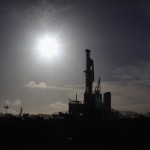Carbon From Power Plants Down as Coal Continues to Decline
Carbon emissisions from power generation are down in the U.S., to their lowest levels in nearly twenty years, and Texas is partly to thank.
A new analysis from the U.S. Energy Information Administration (EIA) reports that “energy-related” carbon emissions have been declining every year (with the exception of 2010) since 2007. That’s when the drilling processes known as hydraulic fracturing, or “fracking,” and horizontal drilling started opening up large domestic sources of natural gas and oil. Texas was the incubator for that technology, and home to the first natural gas-from-fracking boom in the Barnett Shale.
As that natural gas has become easier to drill, its price has gone down, and has been steadily replacing coal for power generation. Natural gas has about half the carbon emissions of coal, and far fewer air pollutants. It’s the least carbon-intensive fossil fuel, according to the EIA.
For a brief time last summer, natural gas actually tied with coal for energy production, and is projected to eclipse it in the coming years. While coal has long been king when it comes to power — a cheap, available domestic fossil fuel — that’s begun to be turned upside down by natural gas from fracking. In Texas, there are no new major coal power plants planned for the state, while natural gas and wind continue to grow.
The EIA also notes that “other factors contributing to the lower emissions include decreased demand for transportation fuels and mild winter temperatures that reduced demand for heating.”
One interesting trend from the analysis is that as natural gas displaces coal, it’s carbon emissions are climbing upwards, as you can see in this graph:
The EIA says that it will have a full analysis of carbon emissions in 2012 later this year.


